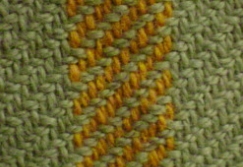SERGE (serj)
A
twilled cloth often used for suits
Common clues: Twilled
fabric; Woolen fabric; Worsted fabric; Suit material; “Suit-able”
material?; Ribbed twill
Crossword
puzzle frequency:
2 times a year
Frequency
in English language:
20261 / 86800
Serge is a type of twill fabric that has diagonal lines or ridges on both sides, made with a two-up, two-down weave. The worsted variety is used in making military uniforms, suits, great and trench coats. Its counterpart, silk serge, is used for linings. French serge is a softer, finer variety. The word is also used for a high quality woolen woven.

A
twill weave can easily be identified by its diagonal lines. This
is 2/2 twill, with two warp threads crossing every two weft
threads.
The name is derived from French serge, itself from Latin serica, from Greek σηρικος (serikos), meaning "silken". The early association of silk serge, Greece, and France is shown by the discovery in Charlemagne's tomb of a piece of silk serge dyed with Byzantine motifs, evidently a gift from the Byzantine Imperial Court in the 8th or 9th century AD.
From early Saxon times, most English wool ("staples") was exported. In the early sixteenth century it went mainly to a Royal monopoly at Calais (then an English possession) and was woven into cloth in France or the Low Countries. However, with the capture of Calais by the French on 7 January 1558, England began expanding its own weaving industry. This was greatly enhanced by the European Wars of Religion (Eighty Years' War, French Wars of Religion); in 1567 Calvinist refugees from the Low Countries included many skilled serge weavers, while Huguenot refugees in the early eighteenth century included many silk and linen weavers. Denim is a cotton fabric with a similar weave; its name is believed to be derived from "serge de Nîmes" after Nîmes in France.
This article is licensed under the GNU Free Documentation License. It uses material from the Wikipedia article "Serge".
|
|